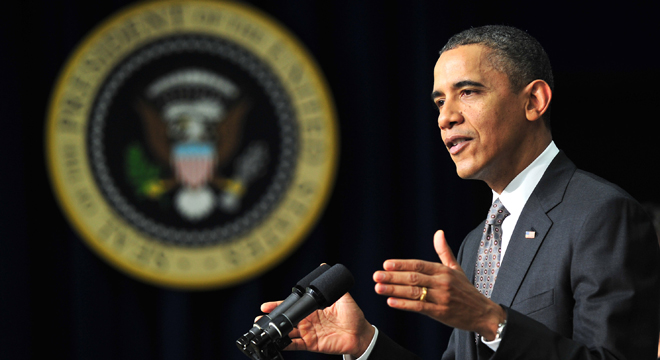It was as certain as cause and effect can be in political maneuvering — President Obama and Senate Democrats finally did to the House GOP what the Republicans have been so adept at: they cornered them legislatively, in this case on the payroll tax cut extension and won a temporary victory. But the more important component for 2012 was the fact that Dems won the PR battle in the media, all while bringing attention to the fact that the payroll tax cut existed in the first place.
While that course of events helped President Obama and Democrats in the short term, the post-Christmas bonus might be a bit sweeter. Tuesday saw the release of new economic numbers showing the recovery speeding slightly, and painting a rosier picture for the near future. Of course, the normal caveat over the last few years has been that any improvement is both fragile and dependent upon stable conditions — for example, a major eruption on the European debt crisis would divert any optimistic prognostications.
But going in to 2012, legislative victories for President Obama are good. Improving economic numbers would be great.
Gallup was the first out on Tuesday with a jump in their own measure of economic confidence, which absolutely plunged after the debt ceiling fight this summer. It’s now recovering to a level closer to the early part of the year. To be sure, Gallup’s result is by no means good, but illustrates just how sour Americans were on the economy during the Congressional spat — it brings confirming data to the charge that the debt ceiling fight actually caused a sizable amount of market damage on the way to staving off the economic disaster that default would have brought on.
“…if Americans’ confidence in the economy in the last week of December is as relatively positive as it was in the three weeks leading up to Christmas, in December it will post the largest monthly increase in economic confidence seen since May,” Gallup wrote in its analysis. “With most of these gains coming from increased public optimism about the economy’s direction, this may be a precursor to further gains at the start of 2012.”
Bloomberg’s numbers followed, again finding the same trend — the path to recovery was diverted in the summer, but since then the process has sped up. “Confidence among U.S. consumers rose in December to the highest level in eight months as an improving job market helped regain all the ground lost following the mid- year government budget battle and credit-rating downgrade,” Bloomberg wrote, going on to cite a slowdown in sliding home values and fewer unemployment claims, supporting the confidence numbers.
Of course, the Democratic victory on the payroll tax extension seems to have paid off in the political short-term — Obama reached positive territory on his approval rating in the Gallup tracking poll for the first time since July, and has been doing better on the metric over the last few weeks. But the latest round of economic data might be able to help with one of the President’s major weak points going into the 2012 election.
The debt ceiling fight and payroll tax examples seems to show that Americans are responding fairly sharply to what comes out of DC on the economy. Now we may see if movement comes to DC’s approval ratings from the economy.






